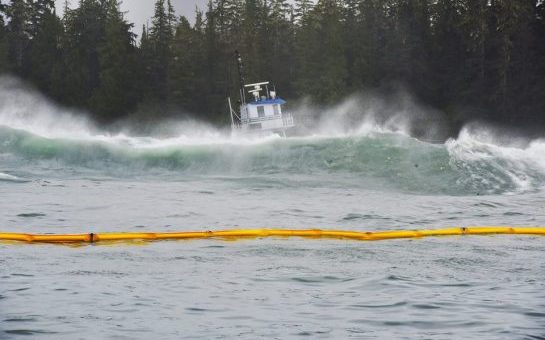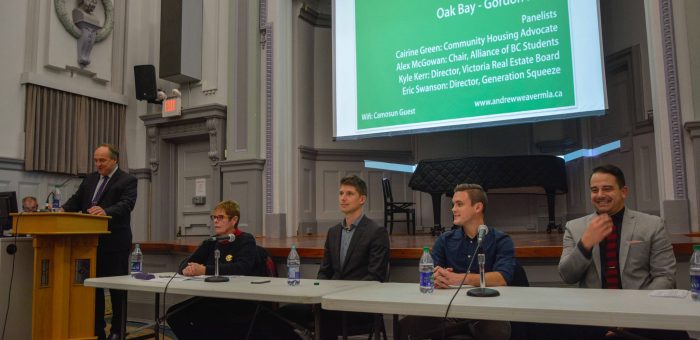Issues & Community Blog - Andrew Weaver: A Climate for Hope - Page 109
Calling for the Resignation of B.C. Minister of Environment
Media Statement: October 27th, 2016
Weaver Calls for the Resignation of B.C. Minister of Environment
For Immediate Release
Victoria, B.C. – “I do not call for this lightly. I have spent my career in the climate science field advising provincial, federal, and international governments on their climate policies. Never in my life have I witnessed a government using such outrageous rhetoric to describe subpar efforts to protect the environment,” said Andrew Weaver, MLA for Oak Bay – Gordon Head and Leader of the B.C. Green Party.
“The ministry’s responsibilities have too often been neglected, forcing citizens to step in and try to protect the environment themselves. British Columbians have been left investigating and mitigating the impacts of environmental tragedies like what happened at the Mt. Polley mine, the Shawnigan contaminated soil facility, and the Bella Bella diesel spill with their own time and money, often employing the courts to force the Ministry to do their job,” said Weaver. “This government’s policy continues to put vested and private interests ahead of their responsibilities they have to the people of British Columbia.
“I now lack confidence in Minister Polak to uphold the obligations outlined in her ministerial mandate letter. As such, I am calling for her to be replaced by a minister who will stand up for the people of B.C. and the water and environment that we all rely on.
“The absence of a real climate policy, the reaction to the Mount Polley tailings pond breach, and the repeated compliance failures at the Shawnigan contaminated soil facility with no real ministerial response are egregious examples that I have tried to work with the Ministry on,” said Weaver. “The Minister’s failed response to the diesel spill in Heiltsuk Territory is the last straw for me.
“It is appalling that the B.C. Liberals can look British Columbians in the eye and tell them that they have a climate leadership plan. They are not climate leaders, and they don’t even have a plan. At least when Mr. Harper was Prime Minister we knew where he stood on environmental protection. Premier Clark and the Minister of Environment claim one thing and does the complete opposite.”
Sonia Furstenau, CVRD Director and BC Green Party candidate for Cowichan Valley is equally frustrated with the impacts provincial policy is having on her community. “In Shawnigan, we are experiencing first-hand the downside of this government’s insistence on ‘getting to yes’ at all costs. The people of Shawnigan are suffering from ongoing stress and anxiety while the Ministry of Environment allows for ongoing non-compliance with the contaminated landfill permit, and compounding failures at the site. This ministry promised the community that all water leaving this site would meet the strictest aquatic and drinking water guidelines, and already, 20 months into the permit, levels of toluene, copper, iron, manganese, aluminum and more have exceeded these guidelines.”
Furstenau has consistently urged the Minister to act. “Under the Environmental Management Act, misrepresentation during permit application stage and ongoing non-compliance since this company began operations gives the Minister more than adequate grounds to revoke this permit. If she won’t use her authority to revoke this permit and protect the people of Shawnigan Lake, she should step down.
-30-
Media Contacts
Mat Wright
Press Secretary for MLA Andrew Weaver
mat.wright@leg.bc.ca
250 216 3382
Sonia Furstenau
sonia.furstenau@bcgreens.ca
250 812 6136
Bella Bella Spill a Wake up Call on Failed “World Class” Containment
Media Statement: October 24th, 2016
Bella Bella Spill a Wake up Call on Failed “World Class” Containment
For immediate release
Victoria, B.C. – “The provincial and federal government’s ability to respond to spills is nowhere near ‘world class’ — it is not even passingly adequate,” says Andrew Weaver, MLA for Oak Bay – Gordon Head and leader of the B.C. Green Party.
“The diesel spill near Bella Bella, B.C. has been ongoing since the 13th and they can’t even keep a containment boom around the leak. What’s even worse is that a spill response boat responding to the accident also sank. You literally can’t make this stuff up.”
The Heiltsuk Nation Chief Marilyn Slett reported that the containment booms around the sunken tug had failed in the face of continuing storms and waves as high as three metres, and the spill had spread. That was later confirmed by the owner of the sunken tug, Kirby Offshore Marine.
“This is devastating to the Heiltsuk Nation and everyone who lives in the region reliant on the coast for sustenance and income,” says Andrew Weaver “This spill, as well as the bunker oil leak in Vancouver Harbour that closed beaches, demonstrate that it is impossible for the provincial and federal governments to meet all of the five conditions set by the province regarding pipeline expansion.
“The people who live in the Bella Bella region deserve to know how this spill will impact their home and health, and how they will be compensated. They are on the front lines trying to save the clam beds and prevent the damage from spreading. The provincial government needs to step up and take an active stake.
“While the news that marine pilots will now be required on all vessels transporting fuel is welcome, this retroactive response clearly demonstrates spill prevention is not the priority it should be.
-30-
Media Contact
Mat Wright – Press Secretary, Andrew Weaver MLA
mat.wright@leg.bc.ca
250 216 3382
Highlights from Housing & Affordability Town Hall
I would like to extend my sincere thanks to everyone who attended and participated in our recent Town Hall on Housing and Affordability. We were lucky to have a diverse range of panelists bring their own perspectives and insights to our discussion about the complex challenges facing our housing market. In the Q&A period following the presentations, audience members provided their personal perspectives on how the housing and affordability crisis has affected them, asked a number of insightful questions and offered some creative potential solutions. It was a lively and informative discussion.
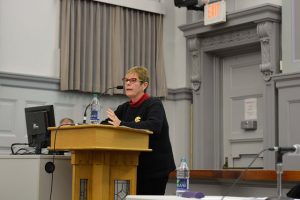
Cairine Green, a Community Housing Advocate and volunteer Board Director for Our Place Society, spoke about some of the causes and the effects of the housing and affordability crisis in Victoria and across the Province. The BC Non-Profit Housing Association defines affordable housing as requiring 30% or less of gross household income (in 2012); two other factors are suitable housing, where there are enough bedrooms for the size and make-up of occupants, and adequacy, where a home does not require major repairs. Increasingly, fewer and fewer people in Victoria live in housing that meets these criteria. Cairine highlighted the importance of affordable housing in maintaining healthy and sustainable communities, and the concerns of low-income seniors who want to be able to stay in their homes as they get older. She outlined the actions that municipalities can take to stem the tide of rising housing costs, and the need for different levels of government to work together to implement solutions.
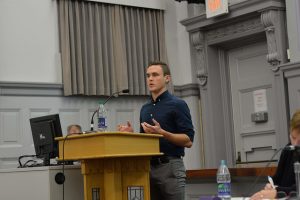 Alex McGowan, Chairperson of the Alliance of BC Students and President at the Kwantlen Student Association, emphasized the challenges facing students looking for housing, as well as the steps that Universities can take to address student housing needs, thereby benefitting the rental market more widely. His comments were supported by Maxwell Nicholson, Director of Campaigns & Community Relations from the UVic Student Society who was also in attendance.
Alex McGowan, Chairperson of the Alliance of BC Students and President at the Kwantlen Student Association, emphasized the challenges facing students looking for housing, as well as the steps that Universities can take to address student housing needs, thereby benefitting the rental market more widely. His comments were supported by Maxwell Nicholson, Director of Campaigns & Community Relations from the UVic Student Society who was also in attendance.
In the last ten years, the number of full-time students in B.C. has steadily grown and the number of international students has nearly doubled, yet very few new residence spaces have opened. There is a high demand for student housing: the Alliance of BC Students estimates that Universities in BC need to double their stock of student housing to meet the need. In 2014/2015 there were 10,900 students on waitlists for campus housing in B.C., nearly 3,000 of which were on the UVic list alone. Student housing is cheap to build, and would play an important role in easing the pressure on the rental market, creating space for those who may be currently in unaffordable housing or squeezed out of the market all together. A serious problem is that the Province won’t allow post-secondary institutions to take on the debt needed to build more student housing on their land. Yet debt undertaken to build campus housing in B.C.’s desperate market would not impact the government’s credit rating as it would be self-supporting through residence fees.
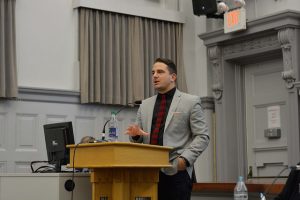 Kyle Kerr, a licensed Realtor with RE/MAX Camosun, Associate Partner with Tony Joe and Associates, and a Director of the Victoria Real Estate Board, brought his insights from his experience in real estate to bear on the crisis in Victoria. He highlighted the factors that make Victoria such an attractive place to live and have led to an increase in net migration here, such as the industries here (including Government, military, tourism and technology), our educational institutions, and the lifestyle that Victoria offers. These strengths make it unlikely that we will see a significant housing crash or a “bursting of the bubble” in Victoria. Kyle also discussed the need to build more affordable housing, and to increase density, to meet demand.
Kyle Kerr, a licensed Realtor with RE/MAX Camosun, Associate Partner with Tony Joe and Associates, and a Director of the Victoria Real Estate Board, brought his insights from his experience in real estate to bear on the crisis in Victoria. He highlighted the factors that make Victoria such an attractive place to live and have led to an increase in net migration here, such as the industries here (including Government, military, tourism and technology), our educational institutions, and the lifestyle that Victoria offers. These strengths make it unlikely that we will see a significant housing crash or a “bursting of the bubble” in Victoria. Kyle also discussed the need to build more affordable housing, and to increase density, to meet demand.
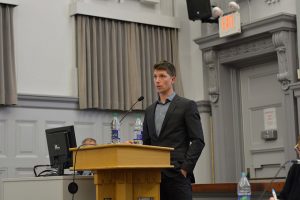 Eric Swanson, Executive Director of Generation Squeeze, showed how the odds that young Canadians face in getting into the housing market and purchasing their own home are difficult, if not impossible, to overcome. He highlighted the differences in the magnitude of the challenges faced by young Canadians today versus forty years ago, in 1976, showing that average earnings have decreased, student debt has increased, and the average housing price has more than doubled, leading to a situation where young Canadians in BC have to save more than three times as long for a down payment on a house today than in 1976.
Eric Swanson, Executive Director of Generation Squeeze, showed how the odds that young Canadians face in getting into the housing market and purchasing their own home are difficult, if not impossible, to overcome. He highlighted the differences in the magnitude of the challenges faced by young Canadians today versus forty years ago, in 1976, showing that average earnings have decreased, student debt has increased, and the average housing price has more than doubled, leading to a situation where young Canadians in BC have to save more than three times as long for a down payment on a house today than in 1976.
Potential solutions to the crisis highlighted by the panelists and explored in the Q&A period include actions that different levels of government and members of the public can take.
The Provincial Government can offer support for co-housing or blended housing, to allow seniors to stay in their homes, while providing an affordable rental option for low-income individuals, families or students. As an essential step in addressing student housing needs, the Province could reverse its stance on preventing universities from acquiring debt to build more on-campus housing.
Municipalities have a number of tools at their disposal that they can use to address the housing crisis. These include:
- Removing minimum unit size requirements;
- Reduce parking requirements for units;
- Removing re-zoning requirements for garden and laneway housing;
- Reviewing housing reserve fund guidelines for grants to developers of affordable housing projects;
- Supporting the conversions of older hotels/motels to housing units;
- Establishing land trusts, in which municipalities contribute publicly-owned land at no cost or at a reduced market value for the development of affordable housing projects;
- Demanding more from developers, such as higher percentages of affordable units to meet community need;
- reducing unnecessary regulations in building codes.
The City of Victoria has already implemented some of these measures, and is considering more, such as “an inclusionary housing density bonus policy” where new housing has to represent the income distribution of the area in which it is built.
Individuals can become familiar with their official community plans and local housing strategy. An important action that individuals can take is to attend council meetings to express their thoughts on proposed projects, especially voicing their support for projects that would result in more affordable housing.
I am grateful for the commitment and ongoing concern so many in our community are giving to this crucial issue facing our Province. There are few topics of more importance facing our Province today.
Comments on MiningWatch Canada Mount Polley Lawsuit
Media Statement: October 18, 2016
Weaver Comments on MiningWatch Canada Mount Polley Lawsuit
For immediate release
Victoria B.C. – “The Mount Polley tailings pond breach shattered public confidence in government and industry’s ability to adequately protect the natural environment during mining operations, and for a good reason,” said Andrew Weaver, Leader of the B.C. Green Party and MLA for Oak Bay Gordon Head, regarding the private prosecution filed by MiningWatch Canada against the B.C. government and the Mount Polley Mining Corporation for violations of the federal Fisheries Act in connection with the 2014 tailings pond breach.
“B.C. had the largest mine waste disaster in Canadian history and yet no charges have been laid. This process cannot be taken lightly by government.The legacy of this incident has tarnished the international reputation of British Columbia’s important mining industry.
“Shortly after the tailings pond breach occurred in August 2014, I visited the Mount Polley mine site and was able to witness the local environmental devastation first hand. It was a sight to behold.
“I have recently spoken to residents who live on Quesnel Lake and know, two years later, that water quality is still a pressing issue. Every winter the lake overturns as the surface waters cool and the residual tailings waste rises to the surface.
“British Columbians deserve a government that will ensure their interests and the environment are protected.
“The B.C. Liberals have upset the balance between protecting the environment and protecting industry. I am grateful there are groups like MiningWatch Canada working to advance a safer equilibrium.”
– 30 –
Media Contact:
Mat Wright
Press Secretary – Andrew Weaver MLA
1 250 216 3382
mat.wright@leg.bc.ca
MLA Town Hall on Housing and Affordability
On Tuesday, Oct. 18, I’ll be hosting a town hall on housing and affordability with four expert panelists. Each speaker comes from a different housing-related background, so they’ll bring a diverse range of perspectives and considerations to our discussion about the complex, multifaceted challenges facing our housing market.
Over the course of the evening we’ll discuss policy and market conditions that have led to our current situation, analyze the immediate challenges we face and look at where we can go from here. We’ll explore what can be done now to increase housing and rental stock and how we can prepare for the future. And, the fundamental question that underpins everything, what do we want our communities to look like in coming years?
Everyone is more than qualified to speak to the concept of a community vision, and I want to give you the opportunity to do so. Reserving plenty of time for audience questions, comments, and discussion is a priority for the event.
In addition to a community housing advocate and three-term municipal councilor, the Director of the Victoria Real Estate Board and the executive director of Generation Squeeze, one of our panelists will be Alex McGowan, chair of the Alliance of B.C. Students. McGowan and his colleagues recently released a report on the influence student housing demands have on a housing market in crisis. They urge the B.C. government to amend existing restrictions on public entity debt that prevents post-secondary institutions from building more on-campus residences.
“We know that as students, we often occupy the low end of the rental spectrum; what we might not realize is who we may be squeezing out of the market altogether,” McGowan said. “Getting students on campus and out of the rental market helps everyone, including the single parent struggling to find housing, the minimum-wage worker who can’t find a rental they can afford, and those who are currently in housing, but spending more than 50 per cent of their income on rent. Our proposal could go a long way to helping B.C.’s rental market come back to a normal level, and at very little cost to the government. It’s time to help students, improve the quality of education and help alleviate the housing crisis that is hurting everyone.”
Preventing post-secondary institutions from taking on the debt to build more housing on their land is defended by the need to protect B.C.’s high credit rating. While that is indeed important, debt undertaken to build campus housing in B.C.’s desperate market would not impact the government’s credit rating as it would be entirely self-supporting through residence fees.
In the last 10 years, the number of full-time students in B.C. has steadily grown and the number of international students has nearly doubled, yet very few new residence spaces have opened.
In 2014/2015 there were 10,900 students on waitlists for campus housing in B.C., nearly 3,000 of which were on the UVic list alone. UVic has 2,481 residence spaces and in 2014 had 16,649 full-time students. With a rental vacancy rate around 0.6 in Victoria, there is clearly an unsustainable discrepancy between the demand for affordable housing and the supply.
As McGowan and the Alliance of B.C. Students have noted, building more student housing is not just about students. It is about alleviating some of the pressure on an overstretched rental market in a timely and responsible manner.
I hope you’ll join us on Tuesday, Oct. 18 from 7 to 9 p.m. in the Gibson Auditorium at Camosun College (Landsdowne Campus Young Building 216) to discuss this, and other solutions, in greater detail.

